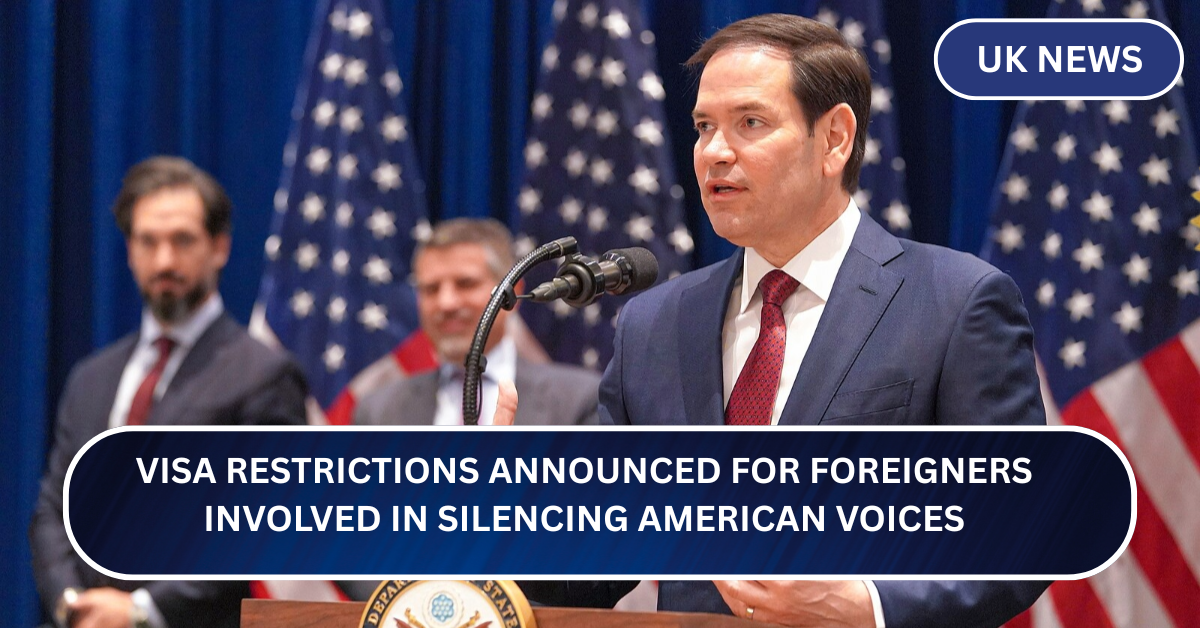In a strong move defending freedom of speech, the United States has announced new visa restrictions aimed at foreign nationals who are involved in suppressing the rights of American citizens to express their views freely. The announcement was made by the US State Department, stating that the country will no longer tolerate actions by foreign individuals or governments that aim to censor or punish Americans for exercising their right to free speech.
This new policy sends a clear message: anyone who takes part in threatening, harassing, spying on, or punishing Americans for their views—especially when those views are expressed online or publicly—may now be denied entry into the United States.
What This Policy Means
Under this visa restriction policy, any foreign national who has directly or indirectly participated in efforts to censor, intimidate, or harm American individuals for their opinions or beliefs can face visa denial or cancellation. The move is seen as a response to increasing global concerns where governments and private actors try to suppress speech beyond their borders.
This includes foreign officials, law enforcement agencies, or even private groups that have worked to silence journalists, activists, academics, or everyday citizens simply because they spoke up about a sensitive topic—be it politics, religion, or human rights.
A Response to Transnational Repression
The policy is being viewed as part of a broader US stance against what is called “transnational repression”—a term used to describe when foreign governments try to punish people in other countries, including Americans, for speaking out against them.
For example, if an American writes something critical about a foreign government on social media, and that government then tries to retaliate by using its intelligence services or legal system to target that person, the US can now restrict visas for those involved.
“We are making it clear that such behavior is unacceptable,” said a spokesperson for the State Department. “The United States stands firmly for the right to free expression and will protect its citizens from foreign threats, no matter where those threats come from.”
Focus on Digital Censorship
One of the key areas this policy touches on is digital censorship. With the rise of social media and international online platforms, it has become easier for authoritarian governments to track down critics—even those living in democratic countries like the US.
In recent years, there have been multiple reports of foreign regimes using spyware to monitor journalists, sending threats to activists living abroad, and pressuring platforms to remove content they find offensive. The new visa rule is aimed directly at discouraging such behavior.
Who Is Affected?
The US government has not released a list of individuals who will be immediately impacted, but it’s clear that this policy gives American diplomats and immigration officials the power to deny entry to anyone found to be connected to efforts that suppress American voices.
This includes government officials, intelligence agents, and even private individuals or organizations believed to be acting under direction from foreign powers.
If someone is found responsible for trying to punish or silence an American citizen for their speech—whether through legal action, surveillance, threats, or other means—they may no longer be allowed to enter the US.
Support from Advocacy Groups
Free speech advocates and human rights organizations have welcomed the move. They say this is an important step toward holding foreign actors accountable for crossing the line when it comes to silencing Americans.
“This policy will help deter governments from extending their repressive tactics beyond their own borders,” said an expert from a US-based digital rights group. “It shows that the United States is serious about protecting its citizens, not just at home but around the world.”
Final Thoughts
As global tensions rise and more countries try to extend their influence overseas, the United States is drawing a firm line. With this new visa restriction policy, the US aims to protect American values—especially the right to speak freely—by making it harder for those who try to censor Americans to visit or operate within the country.
This policy reflects a growing awareness that the fight for free speech is no longer limited to borders. In today’s connected world, defending those rights requires standing up against censorship wherever it happens.




